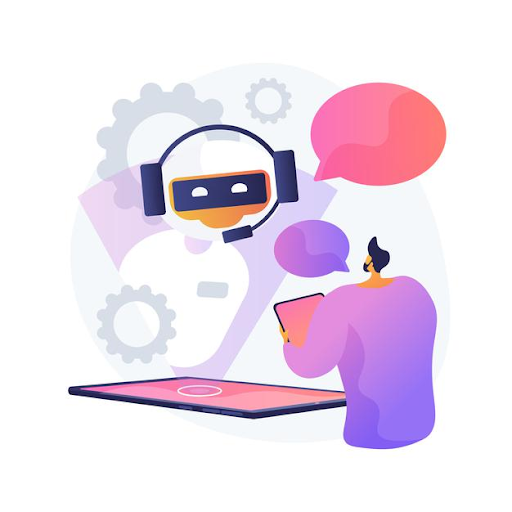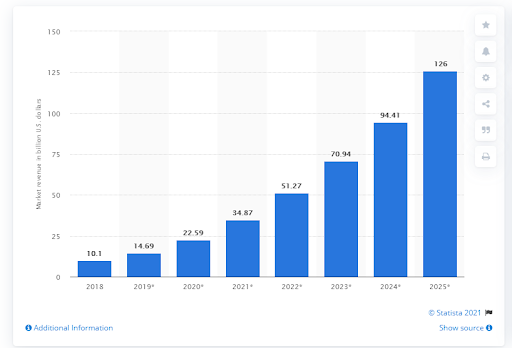Today, artificial intelligence is a fascinating topic in the Tech World. Years back, if I asked you, tell me one complex problem that computers can not solve? Probably your answer would be a human brain. Yes, The human brain is one of the complicated things that even a supercomputer can not solve.
A human is such a creature that has the power of intelligence. So, if I break Artificial Intelligence: Artificial means human-made, and Intelligence means thinking power. Overall, AI is a study that relates a machine to behave like a human, think like a human, and even decide like a human.
“Nobody phrases it this way, but I think that artificial intelligence is almost a humanities discipline. It’s an attempt to understand human intelligence and human cognition.”
—Sebastian Thrun
We all use a smartphone, right? There are numerous powerful AI applications out there; one of them is called Google Assistant, and in the iPhone, there is Siri. We don’t type the queries; indeed, we speak up to upload the queries. Here Google, from its huge database, gives us the answer within a second or millisecond with the help of NLP (Natural Language Processing).
Similarly, artificial intelligence applications influence industrialists and business giants to embrace modern technologies in their work culture. Finding it interesting?.. Let’s excite you more with the market size of AI.
Highlights of Contents
Insightful Facts About The Artificial Intelligence
- According to Statista, the Artificial Intelligence software market will reach approx 126 billion U.S. dollars by 2025.

- As per McKinsey, globally, the data scientists had to exceed supply by more than 50% in 2018. – PWC
- PWC has stated in the coming year 2030, the global GDP will rise by 14% due to AI-powered activities. That is equal to $15.7 TRILLION.
Although, if you are wondering, what about Machine learning? Because I know you have landed up to this blog to know the various uses and applications of both AI and ML.
Well, I will be dealing with both of them step by step; so I request not to leave the blog in the middle; scroll it down to scratch all the information you have accepted earlier.
In the early few paragraphs, I have given you a glimpse of AI; now it’s the turn of Machine learning. Machine learning is again a trendy topic over the web that is grabbing business giants and people worldwide. Now, what exactly is what its real-time uses are?
Machine learning is deep learning plus something else; what is that? That plus is the statistical models such as SVM decision, tree k-means, linear regression, etc.
These come under a single umbrella called machine learning; supervised learning, unsupervised learning, and clustering in machine learning. These are the three or subdomains.
Machine learning is part of artificial intelligence, so if you are doing machine learning, it means you are doing AI.

I hope you are clear with these two different terms: AI and ML. Now, let us jump directly to AI and ML technology applications in the business landscape.
11 AI or ML Uses & Application That You Can Implement In Your Business Today
In this section, we will see how AI and Machine learning is empowering particular industries. Let see the various artificial intelligence applications that are already in use and what we can expect in the future. Although all these applications are harnessed by businesses to optimize business processes, uplit ROI, and stand ahead of the competitors.
1. Chatbots:

The chatbots use cases are one of the most exciting features of AI technology. Many companies are leveraging chatbots in all the different ways to automate communication. Additionally, when we communicate, we are communicating because we have a purpose to our contact.
The purpose is usually task-driven; we want to get something done, we want to get information to know some agenda. When it comes to communicating, chatbots, the best artificial intelligence application, help automate the communication piece. But later on, they can also help to automate the task. There are two different types of use cases, consumer-facing use cases and back-end employee-facing use cases.
In the consumer-facing, any organization can use it in the best way to offer a better customer’s journey. So anytime someone comes to your website or contacts your company, a chatbot could be a part of that process.
The chatbot is mostly useful for gathering information and personalizing the experience for that user. You will know what that person is looking for, and then you will give it to them. Besides, you can also find out things like:
- What is their price range?
- What is their time frame?
- What are their priorities?
With this piece of information, you can tailor-fit and personalize the package as much as possible to them. The other thing you will be able to do is that you will be able to reduce your ad cost, which is like a second additional benefit.
2. Artificial Intelligence in eCommerce:

There are numerous uses for AI: to make fast decisions, automate and optimize various activities to drive better business outcomes, such as leverage the traffic, the ways customers engage, etc.
Many decisions need to be made if you are going to maximize and optimize your business. Companies mostly use AI-based tools to map that all together so that the next customers who come in get the right engagement.
Everything from how you serve a customer on an individual basis to how you optimize the price, optimize the inventory position to streamline both: your fulfillment and customer service operations.
There are several opportunities to leverage AI to complement the business’s people to drive better business outcomes. Embracing AI and ML in the eCommerce business helps them to offer a better customer experience. The AI-based solution lets merchandisers provide a more relevant experience across all of our channels without grunting work.
3. Cybersecurity Defense:

Today among various uses of artificial intelligence, it is also powering our security process in the workplace. Artificial intelligence helps analyze the network packets to figure out the different traffic we are getting to our website. These both modern technologies: AI and ML, offer overrated, high-end security systems to stay far away from cyber threats.
AI application in Cybersecurity can support in expanding the scope of existing Cybersecurity solutions. Besides, it is also helpful in aiding the route for developing better and robust solutions.
4. AI to Improve Workplace Communication:
AI solutions are not only empowering external communication channels but also the internal communication processes. AI and ML applications are effectively revolutionizing various activities at the workplace, from IT Help Desk to development to quality checker to all the level staff of an organization. G Suits an excellent example of artificial intelligence if anyone’s used Gmail in their personal lives or professionally.
AI-based technology is empowering each individual at the workplace. All thanks to the intelligent virtual assistant and automation tool that can resolve various repeatable tasks. The automation tools are lowering the stress level of an individual at the workplace and utilizing the time, hence increasing productivity.
5. Human Resource Management:
There are many different touchpoints recruitment strategies here; we can use technology or AI to improve things. It could be around selection or assessment or using a chatbot to engage better with the candidate.
AI’s role in HR transformation has become endless, from accelerating engagement to building personalized development plans. Mining data and identifying the right information AI can do a lot in HR management. HR is also one area that is also getting a lot of benefit out of AI and ML.
Gartner predicts that by 2020 85% of customer interactions with companies will not involve human representatives; what does it mean? It means that most of these thoughts would be taken away and by artificial intelligence uses. So that means they will take care of these kinds of interactions and improve the business processes’ efficiency. Companies are investing in machine learning analysis, which has trained and learned the behavior, makes recommendations and enables human experience with natural language processing.
6. AI & ML in Health Care:

There are several uses of AI in healthcare; the first and most important use of AI in medical imaging tools such as CT scans, MRI scans, and X-rays are used to diagnose cancers and tumors. It can easily excel radiologists at finding cancers in one research. AI has led to a reduction in error and an increase in early detection of cancers, saving many lives.
AI in healthcare helps preliminary diagnosis; currently, doctors in the emergency departments and GP clinics are overworked and exhausted. Therefore this leads to more errors in patient diagnosis. One of the ways to reduce this error is to use an AI assistant.
Suppose when the patient books an appointment, they also submit a list of symptoms they are experiencing. Using these symptoms, the AI engine behind the scenes can make a couple of pre-diagnosis and send them straight to the doctor, so the doctor knows exactly what to expect before seeing the patient. The AI assistant can successfully reduce the risk of misdiagnosis.
7. Market Prediction:
The AI and machine learning technologies are impacting the trends of marketing in various ways. With the use of neural networks and other existing learning methods, it has become easy to predict its products and services’ upcoming cost. The reason why investors can invest in different trade/stock after analyzing the future of the market. Market prediction is proficient AI applications in business that teach where and how to invest in the market.
8. Streamlined Manufacturing with AI:
Obviously, what numerous manufacturers center around most is their genuine time for production and manufacturing processes. Therefore, artificial intelligence can be utilized from various perspectives to make your manufacturing methods more proficient with quicker yield and less time.
For example, an assembling manufacturer that utilizes CNC machines to process and assemble parts typically utilizes physically keyed projects to take care of business.
In the present AI, the interaction is executed through AI calculations that perform assignments with accuracy and examine the cycle to discover regions where it may be smoothed. That implies less material waste, quicker creation, and more dependable outcomes.
9. AI in FINANCE:
Artificial intelligence and the account business are a match made in delight. The monetary area depends on exactness, constant revealing, and preparing high volumes of quantitative information to decide; all area machines are dominating.
Further, the business observes AI’s proficiency and accuracy; it is quickly actualizing robotization, chatbots, versatile knowledge, algorithmic exchanging, and AI into finance cycles.
10. Artificial Intelligence in Logistics and Supply Chain:
The volumes of data in supply chains and logistics are growing every day. The need for more sophisticated processing solutions is becoming more urgent; that is why many companies are adopting such AI computing techniques, machine learning, deep learning, and natural language processing.
The supply chain is drastically tailored with the increase in technology, the access to data, and making that available across your end-to-end network.
In today’s product workforce, industrial assets will be connected. Collaborative robots will support the operator to work in a better and safer way.
The predictive capabilities of artificial intelligence in business are seriously ramping up company efficiencies; in predictive demand and network planning, the tech uses data to its full potential to better anticipate events, avoid risks and create solutions.
11. AI in Retail:

Another important development of AI is seen in the retail industry. We have seen some of the market leaders looking to introduce AI-driven stores. We are also seeing AI being introduced into bricks and mortar in one way or another. They are using the bots to handle invoicing and payment for various transactional activities.
AI and ML allow retailers to personalize their sites more and more to produce recommendations for our customers. When our customers buy new products, we can personalize the whole site and only show items specifically targeted to them.
Even rearrange the search results on the page better if the customer keeps on searching for the same items. AI also produces insights that can be valuable in creating a shopping basket, analysis dashboard to learn which products shoppers most commonly purchased together.
Conclusion
In this technology-driven world, AI and ML applications have put us forward to look at robust, faster business decisions, fewer human errors, and more. Moreover, in this article, we have counted numerous uses of AI in the business landscape and more in our life.
Do you want to extract hidden insight about your valuable client? Do you want to provide them a resourceful solution? If Yes, AI-powered tools are something you need. Not only, it makes your work automated but also makes it more efficient than your manual works.
Hope you embrace these latest technologies in your business by today to be effortless, countless, and competitively ahead of others.
FAQs
Q1: What are the different applications of artificial intelligence and examples of AI?
A1: The different examples of AI are:
- Chatbot
- Manufacturing robots
- Proactive healthcare management
- Smart assistants
- Disease mapping
- Virtual travel booking agent
- Automated financial investing
- Social media monitoring
Q2: What are some real-life AI applications?
A2: Some of the real-life AI applications are as follows:
- Google’s AI-Powered Predictions: Google Maps
- Ridesharing Apps: Uber
- Spam Filters: Gmail
- Plagiarism Checkers: Turnitin
- Social Networking: Facebook
Q3: How does AI benefit a business?
A3: Some of the fantastic benefits of AI applications in business are:
- Automate repetitive work, thus saving time and money.
- Optimization of tasks
- Increase productivity and operational efficiencies.
- Helpful in making faster business decisions.
- Avoid mistakes and human error.


